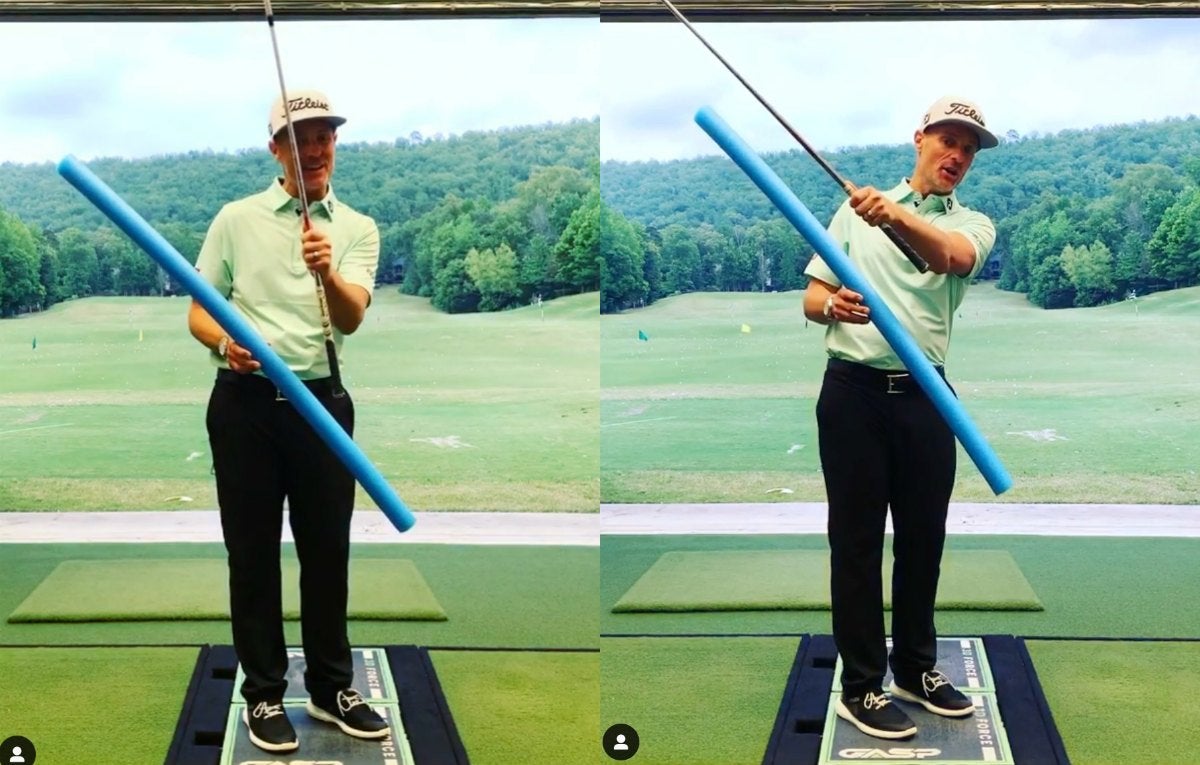If you look like the picture on the left, your wrist angles might be to blame.
INSTAGRAM.COM/BLACKBURNGOLF
Mark Blackburn, GOLF Top 100 Teacher and coach to a number of PGA Tour players, has been putting out some great content on social media recently, so head over to his page and give him a follow. His most recent tip caught my eye because so many golfers struggle with the classic over-the-top move, which makes advice like this especially helpful for so many.
Before we go any further, it’s worth clarifying, for those who may be unfamiliar, what an “over-the-top” move actually is. It’s when the club moves from outside-to-in on the downswing. Paired with a closed clubface, it can result in a nasty pull hook. Match it with an open clubface, and bingo! Slice time.
“Try and feel like you maintain a very wide arc, that you don’t have a lot of wrist set, almost like your thumbs are pointing down. That’s going to keep the sweetspot and club’s center of mass more behind your hands, and give you a really good chance of keeping this club coming from the inside.”
Which brings us back to Mark, who helpfully explains that the problem may lie with your wrist angles. Golfers who struggle coming over the top often have too much wrist set in their swing, which force the shaft into a vertical — steep — position. That’s why Mark suggests feeling like you’re making a wider arc, with less wrist hinge, which will let the center of mass of the club work from more behind you and less over-the-top.
Watch the full video below:
1 swing thought to help cure your over-the-top swing move

If you look like the picture on the left, your wrist angles might be to blame.
INSTAGRAM.COM/BLACKBURNGOLF
Mark Blackburn, GOLF Top 100 Teacher and coach to a number of PGA Tour players, has been putting out some great content on social media recently, so head over to his page and give him a follow. His most recent tip caught my eye because so many golfers struggle with the classic over-the-top move, which makes advice like this especially helpful for so many.
Before we go any further, it’s worth clarifying, for those who may be unfamiliar, what an “over-the-top” move actually is. It’s when the club moves from outside-to-in on the downswing. Paired with a closed clubface, it can result in a nasty pull hook. Match it with an open clubface, and bingo! Slice time.
“Try and feel like you maintain a very wide arc, that you don’t have a lot of wrist set, almost like your thumbs are pointing down. That’s going to keep the sweetspot and club’s center of mass more behind your hands, and give you a really good chance of keeping this club coming from the inside.”
Which brings us back to Mark, who helpfully explains that the problem may lie with your wrist angles. Golfers who struggle coming over the top often have too much wrist set in their swing, which force the shaft into a vertical — steep — position. That’s why Mark suggests feeling like you’re making a wider arc, with less wrist hinge, which will let the center of mass of the club work from more behind you and less over-the-top.
Watch the full video below:
Rules School: Accidentally hit your ball twice in one stroke?
Under the new rules you're granted much more leniency without penalty.


No comments:
Post a Comment